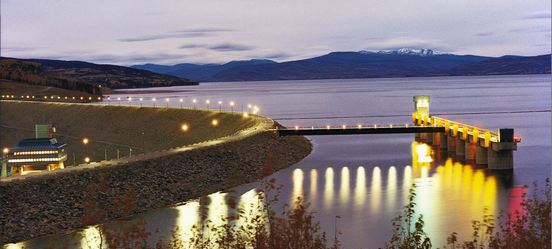Around the world, people are paying the price for carbon emissions—losing their property to rising sea levels, their crops to drought, their homes to floods, their lives to heat waves. As a result, momentum is growing among countries, provinces, states and cities worldwide to put a price on carbon pollution as a way to reduce emissions and drive investment into cleaner options.
In 2008, the Canadian province of British Columbia introduced North America’s first revenue-neutral carbon tax applied to the purchase or use of fuel in British Columbia. The carbon tax has been hailed as the most comprehensive of its kind, covering approximately 70% of provincial emissions. Since the tax is revenue neutral, every dollar generated is returned to British Columbians in the form of personal and business tax measures, such as reductions in personal income tax rates, the Low Income Climate Action Tax Credit and corporate income tax reductions.
Key facts
- The tax is estimated to have reduced emissions in the province by up to 15% from what they would have otherwise been (Murray and Rivers, 2015). The same research also indicates that the tax has had negligible effects on overall economic performance. Between 2007 and 2014, B.C’s. real GDP grew 12.4%, stronger than the Canadian average.
- The ‘West Coast Clean Economy: 2010-2014 Jobs Update’ notes that B.C. has 68,165 clean economy jobs, a 12.5% increase since 2010.
- In B.C.’s cleantech sector, approximately 200 firms generate an estimated $C 1.7 billion in revenue.
The problem
Technology-driven cost reductions in fossil fuel production will lead us to continue using oil, gas, and coal without fully accounting for their environmental impact, unless governments pass new taxes on carbon emissions. A new study from the Massachusetts Institute of Technology concludes that burning all available fossil fuels would raise global average temperatures by 10 to 15 degrees Fahrenheit by the year 2100, which would have catastrophic impact on bio-diversity, public health and well-being, and the economy.

The solution
B.C.’s carbon tax drives transformational change by encouraging clean technology, sustainable economic activity and green jobs, while providing a signal in the economy to reduce emissions.
The intent of carbon pricing is to signal the market to invest in greenhouse gas emission reducing activities to avoid paying the price. In designing a carbon tax that is revenue neutral and broad based with few exceptions, B.C. is purposefully influencing the market and emitters to innovate and find the most cost-efficient methods of reducing emissions to avoid the tax. This often leads to additional benefits from associated savings in energy costs.
Carbon pricing also creates market-based financing opportunities. For example, the price can provide a competitive advantage for businesses with low-carbon profiles, thus increasing the flow of financial resources to these sectors, supporting the transition to a low-carbon economy.
Aided by policies like B.C.’s revenue neutral carbon tax, the clean tech sector has experienced steady growth. The ‘West Coast Clean Economy: 2010-2014 Jobs Update’ notes that B.C. has 68,165 clean economy jobs, a 12.5% increase since 2010. The Update also found that B.C.’s clean economy GDP rose to $C 6.31 billion by 2014, a 19.3% increase from 2010.
By designing the carbon tax as revenue-neutral, B.C. also realizes an opportunity to reduce personal and corporate income taxes. This reduces the drag on the economy by enabling the government to reduce taxes on ‘desirables’ such as income and capital and instead impose tax on an ‘undesirable’ such as emissions.
The tax was introduced at $C 10 per tonne of CO2-equivalent and increased gradually by $C 5/tonne annually until it reached $C 30/tonne in 2012. British Columbia has committed to keep the rate at the $C 30/tonne level until 2018.

Helping the planet
B.C.’s carbon tax applies to emissions from the purchase or use of fuel in British Columbia, covering about 70% of provincial emissions. Since 2008, the tax has set a price signal to help transition to a low-carbon economy. By making renewable energy and energy efficiency options more affordable relative to fuels subject to the tax, it drives adoption of clean solutions. Business and individuals can reduce the amount they pay in carbon tax by reducing fuel consumption, increasing efficiency and using cleaner fuels and technologies.
Helping people
A common concern with carbon pricing is that it may have disproportionate economic impacts on lower-income households. B.C. addressed this by dedicating a portion of revenues to reductions in the first two personal income tax rates and the Low Income Climate Action Tax Credit. Existing analysis confirms that this measure mitigated any regressive impact of the tax.
The carbon price can disproportionally affect higher emitting industries for whom alternatives to fossil fuel use is particularly challenging. To alleviate this, B.C. has implemented innovative policies, such as the Greenhouse Growers Rebate Program and Cement Low Carbon Fuel Program.
The B.C. carbon tax also benefits the clean-tech/low-carbon sector by improving their competitive position relative to higher-carbon industries. This can help them secure financing and talent, and create companies positioned to service this market while addressing climate change.
The carbon price also provides an incentive to B.C.’s provincial public sector organizations to take action to innovate and reduce emissions, helping them to meet their commitment to carbon neutral operations since 2010.
B.C.’s Climate Action Charter supports low-carbon communities. 182 local governments have signed the Charter, committing them to work towards becoming carbon neutral in their operations and building compact, energy efficient communities. The 182 signatories are entitled to grants equivalent to 100% of the carbon taxes they pay to support their greenhouse gas reduction efforts.
Spillover effect
Organizations such as the World Bank and the United Nations have identified B.C.’s revenue-neutral carbon tax as a model to follow. The carbon tax is a “text book” example of how to get carbon pricing right, says the Organization for Economic Cooperation and Development. Other jurisdictions across the world have either contacted B.C. to learn more about the tax or referenced B.C.’s success.
To encourage on-going change around the world, B.C. makes important alliances and partnerships. In 2016, B.C. signed on to the Pacific Coast Climate Leadership Action Plan, supporting work to account for the costs of carbon pollution and advance carbon pricing nationally and globally. B.C. recently renewed its membership with the Climate Group’s States and Regions Alliance, and is now one of 35 subnational governments working together to share expertise.
B.C. also advocates for strong balanced climate action through other partnerships, including the World Bank’s Carbon Pricing Leadership Coalition. The Coalition officially launched at COP21, with the goal to expand the use of effective carbon pricing policies that can maintain competitiveness, create jobs, encourage innovation, and deliver meaningful emissions reductions.




Images owned by the activity partners, all rights reserved.